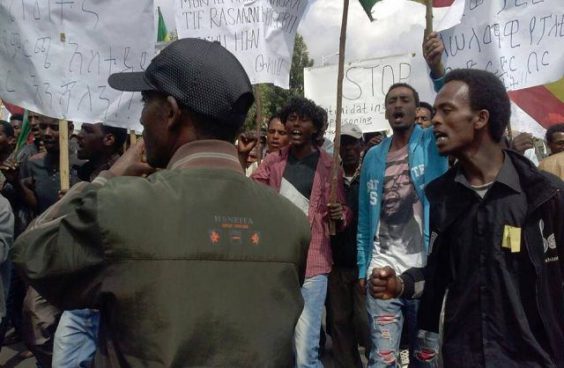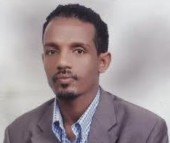Ethiopia’s State of Emergency Makes Peace Impossible
by Chalachew Tadesse / October 21, 2016 / No comments

Oromo protesters in Ethiopia. Image via Flickr user: Gadaa.com
Ethiopia has defined the brutal terms of its state of emergency, and protesters are determined to defy its decrees.
October 9, 2016 was no ordinary day for Ethiopians. For on this fateful day they woke up to the news of a six-month-long draconian state of emergency decree, the first ever in the country since the repressive Ethiopian Peoples’ Revolutionary Democratic Front (EPRDF) came to power in 1991. The embattled and brutal regime has since deployed the army all over the country under the pretext of “quelling violent protests and restoring law and order.” True, Ethiopia has been rocked by a series of violent unprecedented anti-government protests since December 2015 due to mass land dispossession, political and economic marginalization, lack of fundamental freedoms, and pervasive state repression compounded with endemic corruption. Several large, foreign-owned investment companies have also been destroyed, tarnishing the rhetoric of the investment-friendly, fastest-growing economy in Africa.

- This column’s topics will include literature, art, education, history, and political culture in Ethiopia, as well as society and politics in the Horn of Africa. Moreover, I will address the tribulations of journalists and the ill-fated constitutional right of freedom of expression under Ethiopia’s deceptive authoritarian regime. I will try to be the voice of the voiceless, be it persecuted journalists at home or exiled journalists abroad. These themes will make Ethiopia’s uniqueness and absurdities evident.

- Chalachew Tadesse is an Ethiopian journalist and columnist. He has previously worked as a full time journalist for The Reporter and The Sub-Saharan Informer English newspapers. He was also a columnist for the much-acclaimed Fact magazine, before the Ethiopian regime closed it in October 2014. A political science student by training, he works as a university lecturer and is known for his sociopolitical commentaries on the Ethiopian private press.
Circumstances didn’t warrant martial law, though, for the genuine popular dissents were peaceful, only becoming violent when security forces crushed them with lethal force indiscriminately. The regime also mobilizes regular police, militia and Special Forces in nine regional states, as well as heavily armed federal police force in the capital and several other locations throughout the country, so much so that it has the capacity to quell violent protests, if any. Since the public demand has gradually grown to demand for regime change, the only logical explanation is therefore political. That is to say the regime is determined to shut out the whole country from the rest of the world and crush and subdue the intensifying popular insurrection entirely by brute force.
A few days before the decree following gunshots by security forces to disperse protesters at the Oromo Ireecha religious festival in Bishoftu, 40 kilometers from the capital Addis Ababa, more than 50 people were killed in a stampede, some of them drowning in trenches. The security forces were fully responsible because of their live ammunition, while nearly two million gathered at a narrow area surrounded by a big lake and deep trenches. That is why the term “Ireecha massacre” immediately became viral on social media at home and in the Ethiopian Diaspora, sparking massive bloody protests across the country.
Since the outburst of the latest protests, security forces have brutally killed more than 500 civilian protesters. “Proportional use of force” is an unknown term in the government’s vocabulary. However, independent death toll information is always scant, as independent human rights organizations aren’t allowed to operate on the ground. So, the casualty figure is widely believed to be higher. News of fallen young protesters on the streets and mourning mothers is a routine state of affair.
Last month, two highly guarded state prisons were also burned down in ambiguous circumstances, thereby resulting in the death of several inmates. For instance, an unexplained fire in Qilinto prison in the outskirts of the capital, where several political prisoners are housed, killed at least twenty-three inmates. Unsurprisingly, suspicion immediately grew among Ethiopians that the government might have possibly burnt them all intentionally in part to send a message to indicate what it is capable of if fiercely challenged and deflect attention from the growing popular uprising. Even the prominent local independent English publication Addis Standard reported citing eyewitnesses that security forces shot inmates indiscriminately at close range amid the flames. That may explain why, uncharacteristically, the government hasn’t blamed the so called “anti-peace” elements for the fire.
Alas, no independent investigation has been made into any of these latest incidents regardless of suspicion. A request for independent investigations by the UN Human Rights Commission into the killings, torture, mass detentions and disappearance was rebuked. The UN Human Rights Chief then officially pondered, “What, precisely are you hiding from us?” As the regime maintained its silence, Ethiopians responded to themselves, “Well, the regime has kept you off many atrocities!”
Following the state of emergency decree, the government issued a harsh directive suspending nearly all basic fundamental rights such as freedom of expression, press, peaceful demonstration, assembly, and partially freedom of movement. Security forces can stop and search anyone and any home without court authorization and detain people indefinitely. A night curfew is also imposed in areas where large infrastructures and factories are situated. Limiting the freedom of movement of foreign diplomats outside a 40 kilometer (25 mile) radius of the capital without prior permission has also come as a surprise.
Legally registered political parties aren’t allowed to issue statements–which are deemed to pose a threat to the “sovereignty, security and the constitutional order of the country”–to both domestic and foreign press. Using social media to communicate with “terrorist and anti-peace groups” is also criminalized. Even worse, posting any opinion or information on Facebook and Twitter about the popular uprising can now result in a five year jail sentence. Similarly, any publication or communication verbally, in writing, or in physical signs, about the uprising, and forming the political gesture of crossed arms above one’s head have also been banned.
Prohibitions have also been imposed by the decree on the people’s right to watch the Ethiopian Satellite Television and Oromia Media Network TV channels and other “anti-peace” media broadcasts based in the Diaspora.. For fear of the free flow of information, the regime has long de facto branded them as affiliates to “terrorist” groups. Truth be told, these TV channels, along with other diaspora radios–including Wazema Radio podcast, for which I am currently working–have been the only credible sources of information for Ethiopians on the protests in the country.
Publications that carry content believed to instigate political violence are also prohibited by the decree. Alas, the government has a track record of broadly interpreting and arbitrarily manipulating its own laws to advance its own sinister agenda. Hence, the decree is so draconian that the impact on freedom of press was felt immediately. Several private printing houses immediately rebuffed publishing independent publications for fear of being branded as complicit with deliberate dissemination of political content.
All the protesters who have participated in the hitherto violent protests across the country are given ten days by the decree to give themselves in to the police. In the meantime, security forces are rounding up several thousands of people, locking them in notorious detention camps in hostile and malaria-infected areas. Mind you, this is Ethiopia, where a state of emergency isn’t likely to be like any state of emergency you can imagine. Security forces are given extensive powers, including taking the necessary action against anyone perceived to violate the decree. In the language of the government, necessary action amounts to the indiscriminate use of lethal force.
No matter the brutality of the regime’s responses, protesters in my hometown of Bahr Dar and Gondar–the two northern largest cities–have defied the decree with sit-in strikes for the last few days. Put simply, Ethiopia has now morphed into a 21st century Orwellian nation, where a quintessentially tyrannical regime censors everything the people should speak, hear, write, or read. Most of what we see is reminiscent of the mid-1970s, when a military junta, the very regime the incumbent toppled in 1991, swept the nation with bloodbath during the infamous Red Terror (Qey Shibir) massacres against one generation.
As an authoritarian regime, Ethiopia’s incumbent is always known for quintessentially blaming a foreign enemy–usually neighboring Eritrea—for unrests. Foreign enemies, Ethiopians are told over and over, have posed imminent and existential threat to the country’s survival. This time however, the new scapegoat for the state of emergency is Egypt, which has been accused of meddling in the country’s internal affairs by organizing and financing dissident armed groups, namely the Oromo Liberation Front (OLF), a blacklisted terrorist armed insurgent group based in neighboring Eritrea. Why Egypt? Because Egypt has a longstanding row over the construction of Ethiopia’s Grand Renaissance Dam on the Blue Nile River, which many Egyptians believe will affect their country’s water security.
Here comes an interesting irony. Ethiopia was accused by Egypt of deliberately starting the construction of the dam in 2011 by taking advantage of Egypt’s bloody Arab Spring. Now, Ethiopia is facing its own Egyptian-style uprising while, at the same time, it is accusing Egypt of conspiring to thwart the dam amid the ongoing popular protest.
Ethiopia’s Prime Minister Hailemariam Desalegn surprised world leaders at the UN General Assembly meeting in September. In a disgraceful speech, he called for urgent world-wide scrutiny of social media, blaming social media activists for inciting violence. Ironically, however, Ethiopia is a country with the lowest internet penetration in Africa. Hence, the digital age is a luxury for Ethiopians, even though it has provided a platform in the capital and some other large cities for exposing the regime’s excessive use of force, including graphic state atrocities perpetrated by the infamous Agazi, the state army’s most brutal death squad. Whether on social media or not, most ordinary folks experience brutal repression on a daily basis by a tyrannical regime widely seen by Ethiopians as a historical aberration.
Thanks to the perennial illusion of a small clique of rebel-turned-ethnic fanatic politicians of the Tigray People’s Liberation Front (TPLF), the nucleus of the ruling EPRDF, Ethiopia has been turned into a ghost nation without citizens, so to speak. Needless to say, Ethiopia is literally passing from crisis through crisis to crisis. Surely, the old guards must be naïve to expect to reap a semblance of order and obedience from the self-defeating draconian martial law. Nothing can be gained other than making a lasting negotiated and peaceful political settlement almost impossible. Despite all this, we haven’t seen even the slightest amount of cosmetic reforms to appease protesters and the regime’s Western allies, notably the United States.
Today two opposite paths stand out: one is the righteous path to a broad-based, all-inclusive transitional government before it is too late. Worryingly, such a scenario, which must come from the regime, is increasingly becoming less likely. The other path (alas, the regime seems determined to choose this) will without a doubt make the nation a theater of unprecedented tragedy. God forbid it, should that be the case — one needn’t be prophetic to imagine the whole nation exploding into a vicious civil war.
And today, the nation’s sky is engulfed by a momentous but unpredictable wind of change. What will my “Double-Faced Ethiopia” column be like a year or two from now?




